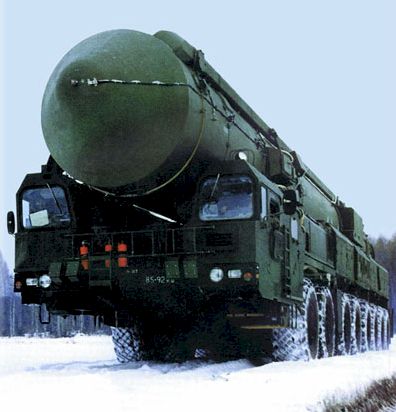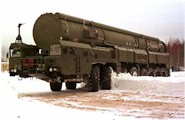
Posted on 12/14/2006 1:58:56 PM PST by Tailgunner Joe
"I shall be an autocrat, that's my trade." Thus quipped the Empress of Russia, Catherine the Great, who stamped Russian authority onto the international stage, seizing vast swathes of territory and establishing Russia as a formidable power in the middle of the eighteenth century. It appears that Vladimir Putin has taken her example to heart.
Buoyed up by high energy prices, Putin has embarked on an aggressive foreign policy agenda which seeks to re-establish Russia as a pre-eminent international power in opposition to what it perceives to be American and European hegemony. This foreign policy agenda is based around two primary goals, namely tightening Russian control over the former Soviet Republics and tightening alliances and friendships with like-minded states and in areas of strategic importance.
In Russia's quest for international influence she has courted some of the most noxious regimes in the world and adopted methods which can only charitably be described as unscrupulous. These methods include arms sales to war-mongering regimes in the Middle East, the use of its energy resources as a diplomatic weapon - especially against its neighbours, and obstructionism in the UN on matters such as Darfur and Iran's nuclear weapons programme.
The republics of the former Soviet empire or, as the Kremlin refers to them, Russia's "Near Abroad" have been the most obvious targets of Russian assertiveness. For example, Moscow has unabashedly promoted separatism in Georgia's breakaway territories, Abkhazia and South Ossetia in response to Georgia's pro-Western orientation and its attempts to join NATO. In September this year, after Georgia arrested and deported four alleged Russian spies Moscow reacted viciously, suspending all transport and postal links to Georgia, making it impossible for the thousands of Georgian migrant workers in Russia to send home remittances which account for twenty percent of Georgia's GDP.
Putin has also asserted Russian influence in Ukraine, openly supporting the pro-Russian Victor Yanukovych against Victor Yushenko in the Ukrainian 2004 elections and exuding hostility ever-since Yushenko took power in the "Orange Revolution. As in Georgia, Ukraine's tightening relationship with NATO has been a major cause behind Russia's antagonism. In January this year, Gazprom, the state-controlled Russian gas giant and world's largest gas producer, turned off the gas supply to Ukraine after price-negotiations broke down. This cut also caused the supply to Europe to drop by as much as forty percent since the main pipeline supplying Europe runs through Ukraine, reminding the continent of the importance of keeping the Russian taps turned on which provides Europe with over thirty percent of its gas requirements. Gas prices have also been steeply increased for the Baltic states which all turned away from Russia's orbit and joined the EU in 2004.
By contrast, Putin has also propped up Alexander Lukashenko, Belarus' authoritarian ruler with cheap energy, loans and political support, and the two countries have a loose agreement to form a political union. Support for Lukashenko, who won re-election in 2006 in a deeply flawed poll, comes precisely because Lukashenko is loyal to Moscow and has a similar anti-Western outlook to Putin. Belarus' panoply of human rights abuses and poisonous foreign policies, like arms sales to Iran, are immaterial to the Kremlin (which indulges in much worse anyway) next to the importance of preserving its anti-Western alliance.
Moscow has also not shied away from military action to preserve Russian control of its dominions. The two devastating wars which Russia has fought in Chechnya, in which over 200,000 Chechen civilians have been killed, is the clearest and most brutal example of Moscow's determination to maintain an iron-grip on its outlying regions and territories.
The establishment and strengthening of multi-lateral alliances such as the Shanghai Cooperation Organisation (SCO), consisting of the former Soviet Central Asian Republics and China, is an important tool for Moscow in its efforts to counter what it sees as the encroachment of Western influence into the traditional spheres of Russian authority. Russia has also increasingly aligned itself with China to form a bulwark against Western dominance of global affairs and has advanced this alliance through arms sales, joint war-games and by building pipelines to China to quench Beijing's thirst for oil and gas.
Arms sales have been a favourite tactic of Moscow to curry favour and influence and Russia has, for example, provided large amounts of arms to Syria and Iran. In December 2005, Russia signed a contract with Iran to provide it with around thirty of the highly sophisticated TOR-M1 air-defence systems. In April 2005, Russia completed the sale of advanced anti-aircraft Igla missiles to Syria and was only dissuaded from selling its Iskander-E, 300km-range tactical missile to Damascus by strong American pressure. Russia also sold large numbers of advanced anti-tank missiles to Syria and Iran during the 1990s, some of which were subsequently transferred to Hezb'allah and used to deadly effect against Israeli soldiers and tanks in the Israel-Lebanon Conflict this summer.
Further enhancing its reputation as arms supplier to the world's tyrannical regimes, Russia sold twelve MiG-29 warplanes to Sudan in 2002, a country whose government has been complicit in the genocide of approximately 400,000 people in Sudan's western province of Darfur.
Russian energy companies have also signed contracts for the development and exploitation of oil resources in Sudan and have agreed to increase "cooperation in the exploitation and development of oil and gas fields and the transportation, utilization and sale of gas" in Iran. In light of these commercial interests it is easy to see why Moscow has threatened to use its veto in the Security Council to block meaningful sanctions against Sudan which would seek to halt the ongoing ethnic-cleansing there, and against Iran to force it to cease its uranium enrichment program. Moscow's one billion dollar contract to build Iran's Bushehr nuclear reactor also clearly influenced this attitude.
Russia further advanced its confrontational foreign policy when Putin invited the Hamas top-brass for talks in Moscow in March 2006 after Hamas' victory in the Palestinian legislative elections. This move from the Kremlin was yet another cynical attempt to underline the independence of Russian foreign policy from the U.S. and the West and increase Russian influence in the Middle East. Why else would a country, which has experienced the horrors of Islamist terrorism like the Beslan school massacre, court Hamas which has been one of the pioneers of the Islamic terrorist creed?
The recent spate of politically motivated killings of prominent Russian critics of Putin and the Chechen Wars, point to possible Kremlin connivance and testify to the government's growing authoritarian nature. They also illustrate Moscow's extreme sensitivity to criticism of its foreign policy and its unwillingness to brook dissent. The poisoning and death of former KGB Lieutenant-Colonel Alexander Litvinenko in November is just one in a series of assassinations of those who have drawn the Kremlin's ire. The deaths of Litvinenko, Duma Deputy Sergei Yushenkov in April 2003 and Duma Deputy Yuri Shchekochikhin in July of the same year are all linked by the fact that these individuals had accused the Russian Federal Security Service (FSB) of coordinating the Russian apartment bombings of 1999, which killed over three hundred people, in order to give Russia a pretext for starting the second Chechen war. The evidence relating to the key event supporting this allegation was sealed by the Duma for seventy-five years. The slaying of the prominent war-critic Anna Politkovskaya in October appears to offer similar testimony to Moscow's ruthless attitude to its opponents.
Russia remains a formidable power in global affairs and Moscow is positioning itself at the nexus of an international movement to defy and oppose Western influence. It is clear that Russia is forging ahead with its plans to re-capture its former authority and that its malign influence is spreading out over much of Asia and beyond. What is not clear is if, and how, the West will try to rein in the Resurgent Bear.
Ah yes, the old "Win/Lose" paradigm. Putin is a small minded small man.
I've said it before and I'll say it again:
Putin is just as convinced that he is the rightful leader of the world's sole superpower as President Bush is.
Anybody who expects the Russians to stop being Russians simply because the intelligentsia have abandoned Marxism-Leninism is a fool.
In fact, it didn't really start with the Marxists/Leninists. The czars thought of themselves as the rulers of the world as well. It's a cultural thing.
WTF. Must be vodka talking.
Why isn't China on the list of powers that Russia is concerned about? The Russian birthrate is practically ceding large chunks of Siberia to the Chinese while the Russians sell them advanced weapons and technology. It isn't going to be Americans who repopulate Siberia.

If you read Steyn's book you should feel safe as the Russians are reproducing themselves into oblivion.
What sort of monstrous vehicle is this you have posted?
It may take a while :)

That beast is the new Russian silo/road-mobile launcher SS27 - Topol-M Intercontinental Ballistic Missile (ICBM) The SS-27 can strike any target within the continental United States & Canada.
The 47-ton intercontinental ballistic missile compares to the US-built Minuteman-3. The SS-27 design is easily compatible for Multiple Independent Reentry Vehicles (MIRV) warheads, up to six nuclear warheads.
In July 2006, Russia's Strategic Rocket Forces had 502 operational missile systems of four different types. Intercontinental ballistic missiles of these systems could carry 1852 warheads.
Strategic Rocket Forces is a separate branch of the Russia's Armed Forces, subordinated directly to the General Staff & of course Putin.
The threat to the West:
The missile is claimed by its Russian designers to be immune to any planned US ABM defense. It is said to be capable of making evasive maneuvers to avoid a kill by terminal phase interceptors, and is likely to carry targeting countermeasures and decoys.
It is shielded against radiation, EMP, nuclear blasts in distances less than 500 meters, and is designed to survive a hit from any laser technology.
A Submarine-Launched-Ballistic-Missile (SLBM) version is being developed under the code name Bulava, or the NATO reporting name SS-NX-30.

According to the Russian military, the Bulava possesses advanced defense capabilities making it nearly impervious to existing missile-defense systems. Among its claimed abilities are: evasive maneuvering, mid-course countermeasures and decoys, and a warhead fully shielded against both physical and EMP damage. The Bulava is allegedly capable of surviving a nuclear blast at a minimum distance of 500 meters.
The current version of the Bulava is able to carry up to six MIRV warheads, future variants are expected to carry a maximum of ten. A full-capacity payload requires the forfeiture of all final stage countermeasures and of some shielding.
According to The Washington Times, Russia already conducted a successful test of their evasive payload delivery system. The missile was launched on November 1, 2005 from the Kapustin Yar facility. The warhead changed course after separating from the launcher, making it difficult to predict a re-entry trajectory.
It would appear Putin is planning for a first strike nuclear war.
Disclaimer: Opinions posted on Free Republic are those of the individual posters and do not necessarily represent the opinion of Free Republic or its management. All materials posted herein are protected by copyright law and the exemption for fair use of copyrighted works.